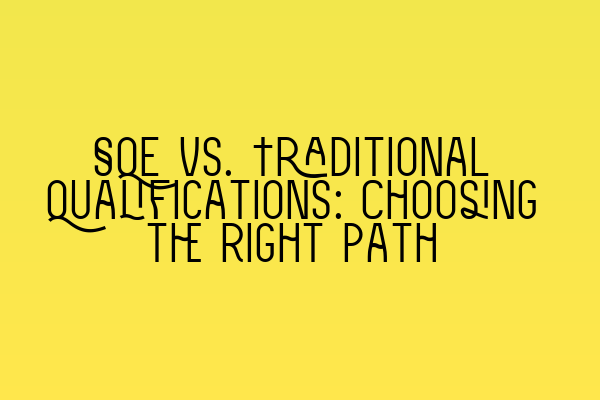SQE vs. Traditional Qualifications: Choosing the Right Path
Choosing the right path for your legal career is a crucial decision that can have a significant impact on your future. With the introduction of the Solicitors Qualifying Examination (SQE), aspiring solicitors now have a new option to consider alongside the traditional route of qualifying. In this blog post, we will explore the key differences between SQE and traditional qualifications, helping you make an informed decision about which path is right for you.
What is the SQE?
The Solicitors Qualifying Examination (SQE) is a new assessment that is set to replace the current pathway to qualifying as a solicitor in England and Wales. The SQE is designed to assess the knowledge and skills necessary to practice as a solicitor, and it consists of two stages – SQE1 and SQE2.
SQE1 focuses on testing candidates’ legal knowledge and is made up of multiple-choice questions and written tasks. SQE2 assesses candidates’ practical legal skills through tasks such as client interviewing, advocacy, and legal research.
One of the key advantages of the SQE is its standardization. Regardless of the route taken to prepare for the examination, all candidates will be assessed on the same set of skills and knowledge, creating a level playing field for aspiring solicitors.
Traditional Qualifications
Before the introduction of the SQE, aspiring solicitors typically followed a traditional pathway to qualification. This included completing a qualifying law degree or a non-law degree followed by the Graduate Diploma in Law (GDL), and then undertaking the Legal Practice Course (LPC).
The traditional route offered a structured and well-established path to qualification, with each stage building on the knowledge and skills acquired in the previous one. However, one drawback of the traditional route was the lack of consistency in assessment methods, with different institutions using different approaches to evaluate candidates.
Another consideration when deciding on the traditional route is the cost. Completing a law degree, the GDL, and the LPC can be expensive, and many aspiring solicitors find themselves burdened with significant student loan debt upon qualification.
Key Differences
Now, let’s take a closer look at the key differences between the SQE and traditional qualifications:
- Structure: The traditional route consists of multiple stages, whereas the SQE is broken down into two distinct parts – SQE1 and SQE2.
- Assessment: The assessment methods differ between the two routes. The traditional route typically includes essays, exams, and coursework, while the SQE is primarily based on multiple-choice questions and practical tasks.
- Flexibility: The SQE offers more flexibility in terms of the preparation journey. Candidates can choose from a variety of providers and study options tailored to their individual preferences and learning styles.
- Standardization: Unlike the traditional route, the SQE provides a standardized assessment process, ensuring that all candidates are evaluated on the same set of skills and knowledge.
- Cost: The cost of qualifying through the traditional route can be significantly higher due to the requirement of completing multiple qualifications. In contrast, the SQE offers a potentially more cost-effective pathway to qualification.
Choosing the Right Path
So, which path should you choose? The answer depends on your individual circumstances, preferences, and career goals. If you value structure and are willing to invest in a traditional legal education, the traditional route may be the right choice for you.
On the other hand, if you prefer a more flexible and potentially cost-effective path, the SQE could be the ideal option. The SQE allows you to choose from a variety of preparation materials and providers, giving you the freedom to tailor your study journey to suit your needs.
Regardless of the path you choose, it is crucial to supplement your preparation with additional resources and support. Mock exams, for example, can be an excellent way to assess your progress and identify areas for improvement. Top Resources for SQE Preparation: Tools to Help You Succeed offers a comprehensive list of resources that can aid you in your SQE journey.
Similarly, SQE Mock Debrief Sessions: Analyzing Your Performance for Growth can provide valuable insights into your performance and help you refine your exam technique.
Remember, the choice between the SQE and traditional qualifications is a personal one, and there is no one-size-fits-all answer. Consider your goals, preferences, and resources, and weigh the pros and cons of each option before making a decision.
Conclusion
Choosing the right path to qualify as a solicitor is a significant decision that requires careful consideration. The introduction of the SQE provides aspiring solicitors with an alternative to the traditional qualification route, offering greater flexibility, standardization, and potentially reduced costs.
To learn more about the SQE and how to succeed in your preparation journey, check out these related articles:
- The Importance of Mocks in SQE Preparation: A Game Changer
- Unveiling the Solicitors Qualifying Examination (SQE): What You Need to Know
- Tips for SQE Success: Key Pointers for a Stellar Performance
Remember, the choice between the SQE and traditional qualifications ultimately depends on your individual circumstances and career goals. Take the time to research and assess your options, and make a decision that aligns with your aspirations and preferences.

Leave a Reply